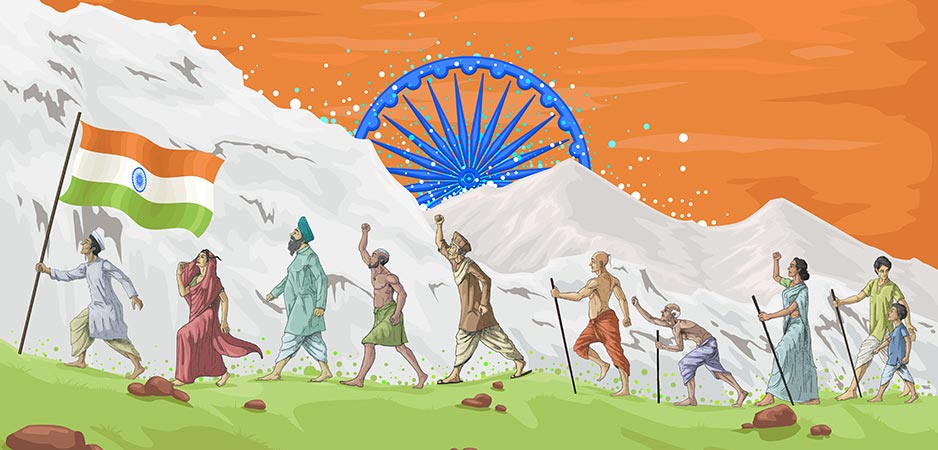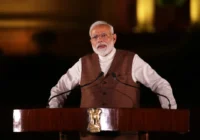Citizenship is fundamental to any republic, and the executive branch has the right and obligation to keep track of the number of citizens and non-citizens residing in its territory. The National Register of Citizens (NRC) and the recently passed Citizenship Amendment Act (CAA) in India are worthy goals.
However, considering the historical forces that have shaped the nascent republic and its growth trajectory since independence, it is too early to implement such measures. The staying power of anti-CAA/NRC protests — initiated primarily by poor and middle-class Indian women — reflects either outright denial or ignorance of those realities by all branches of government.
India’s Citizenship Act Is About Vote Banks
There is ample evidence supporting the current government’s claim that the CAA and the NRC are not its ideas and were proposed by previous administrations, often led by rival political parties. Prime Minister Narendra Modi’s immediate predecessor, Manmohan Singh, who hails from the opposing Congress party, is on record supporting humane solutions to the refugee crisis in India. But when the ruling Bharatiya Janata Party (BJP) uses it to justify enacting the CAA, it conveniently ignores that Singh didn’t single out the countries of origin the BJP has chosen and didn’t advocate excluding persecuted Muslims.
Regarding the NRC, Singh’s predecessor, Atal Bihari Vajpayee, initiated a project in 2003 to create a National Population Register (NPR), which was intended to be a headcount of all residents, citizens and non-citizens across India. According to the text of that law, the NPR “may” form the basis for the NRC. As the NPR was rolled out, along with a parallel NRC on a smaller scale, Vajpayee’s BJP-led government and the subsequent Congress-led government found out that the “document base is weak, especially in rural areas.” So much so that only around 45% of residents could prove their Indian citizenship.
Complex History
There are multiple historic reasons for the weak document base. The Partition of India and Pakistan in 1947, and then Bangladesh in 1971, forced millions to leave everything behind and seek refuge in India. The complex, century-old migration history in the state of Assam has created such deep-rooted citizenship issues that, by all accounts, a Supreme Court-mandated NRC was a fiasco in terms of its cost and outcome.
Health-care services in rural India are spotty, and the government cannot claim that it is issuing certificates for every birth, let alone preserving a tamper-proof record of it. Floods washing away people’s homes is a routine occurrence in several parts of India. For a documentary we shot in 2013, we encountered Mritak Sangh, an organization of hundreds of people who are alive but have been declared legally dead by government officials after accepting bribes from their relatives harboring ulterior motives. As a result, when the Congress-led Singh government launched another NPR in 2010, it quietly shelved both the NRC and the CAA.
The incumbent executive branch ignored all these facts to ram a CAA through Parliament, which excluded Muslim refugees from only three countries — Pakistan, Afghanistan and Bangladesh — from eligibility for citizenship without any cogent explanation. The minister for home affairs, Amit Shah, was on record explaining the chronology of implementing the CAA first and following it up with the NRC. According to some reports, once the Ministry of Home Affairs notifies the CAA rules, it would even require refugees to furnish a farcical proof of religion.
It would have been prudent to wait for a generation or two to ensure every citizen had adequate proof of citizenship to implement such costly policies, but with a crumbling economy, a 45-year-high unemployment rate and elections coming up in the state of Delhi, the BJP needed another divisive issue to distract voters.
Such thorny issues should have been discussed in both houses of Parliament, especially the upper house, the Rajya Sabha, where the BJP does not enjoy a majority. Unfortunately, as in the case of abrogation of Article 370, criminalization of the triple talaq and the amendment of Unlawful Activities Prevention Act and the Right to Information Act, the opposition fell short of its constitutional duty. Fearing a majoritarian backlash, it looked the other way.
Failed by Political Parties
Modi has belatedly tried to backtrack on Shah’s stated chronology, but trust in him is in short supply. No wonder the responsibility of opposing the CAA and the NRC fell on the most vulnerable section of the society: women and children of Shaheen Bagh and assorted other neighborhoods across India. Failed by all political parties and facing statelessness, they blocked the streets and began an indefinite strike.
The BJP’s shrill anti-protester rhetoric during the recently concluded Delhi election campaign has exposed the hypocrisy of its claim that it was empowering Muslim women when it criminalized the triple talaq, but the recent suo moto action of the Supreme Court has gone a step further. While it has not shown any urgency in hearing the petitions against the CAA or the NRC, it suddenly sprung up in action against the tragic death of a four-month-old infant in Shaheen Bagh, chiding the protesting mother for negligence. Notwithstanding the death of their son, the couple has announced that it will not stop its protest.
Without condoning the loss of life, it is worth pondering over the desperation that is driving the parents to continue protesting against the law. In modern republics, courts are considered the last resort of the powerless. Unfortunately, the judiciary seems to be a silent spectator as the Modi government is on the verge of stripping scores of Indians off their citizenship — the foundation of their power.
Amid this failure of the executive, legislative and judicial branches, the only silver lining is the resounding victory of the Aam Aadmi Party (AAP) in Delhi on February 11. Its leader, Arvind Kejriwal, could be blamed for not openly expressing solidarity with the protesters, but he studiously avoided BJP’s despicable rhetoric and religion-baiting. Instead, his campaign focused on health care, education and job creation. With the AAP’s reelection, the republic is back from the dead, but it is still on life support in an intensive care unit. It is a long way away from full recovery.
The views expressed in this article are the author’s own and do not necessarily reflect Fair Observer’s editorial policy.
Support Fair Observer
We rely on your support for our independence, diversity and quality.
For more than 10 years, Fair Observer has been free, fair and independent. No billionaire owns us, no advertisers control us. We are a reader-supported nonprofit. Unlike many other publications, we keep our content free for readers regardless of where they live or whether they can afford to pay. We have no paywalls and no ads.
In the post-truth era of fake news, echo chambers and filter bubbles, we publish a plurality of perspectives from around the world. Anyone can publish with us, but everyone goes through a rigorous editorial process. So, you get fact-checked, well-reasoned content instead of noise.
We publish 2,500+ voices from 90+ countries. We also conduct education and training programs
on subjects ranging from digital media and journalism to writing and critical thinking. This
doesn’t come cheap. Servers, editors, trainers and web developers cost
money.
Please consider supporting us on a regular basis as a recurring donor or a
sustaining member.
Will you support FO’s journalism?
We rely on your support for our independence, diversity and quality.






